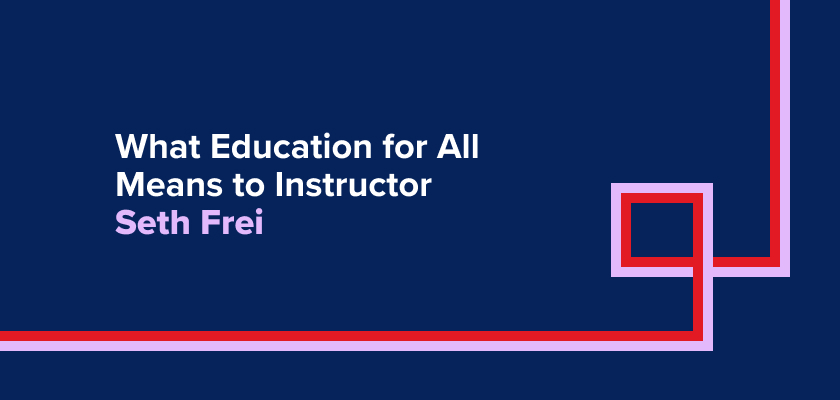Education for All: Instructor Seth Frei Shares What It Means to Him
When I think of Education for All, I think of the importance of hearing all voices in the classroom.

“Education for All” is an evolving concept within the world of higher education, one that can mean different things to different people. At McGraw Hill, we have worked to uncover its meaning and are shaping our course materials accordingly to fit the needs of institutions, instructors, and students as they strive to make education a more equitable experience for all.
To that end, we have launched several initiatives, among them our recent white paper, Education for All: What It Takes to Get There. It unpacks Education for All and offers a framework designed to help educators advance it. Another is this blog series in which we ask instructors and students to tell us in their own words what Education for All means to them.
Seth Frei, an instructor at Texas State University, is our third featured respondent. Among the cogent points that he makes in answering the question is his observation about the impact of Inclusive Access (IA)* within higher education—not just on a student’s ability to access course materials, but on a student’s ability to have a voice in the classroom.
His observation dovetails with a key point made in the “Being and Belonging” focus area of the Success in Higher Education Framework found in our white paper:
While academic achievement is certainly a goal in Education for All, it is impossible to reach if a student does not feel they belong or does not have opportunities to participate in their academic community.
Here's what Seth had to say:
When I think of Education for All, I think of the importance of hearing all voices in the classroom. Every student has something to share and as a faculty member, I want to create an environment where they are comfortable and willing to share.
For students to be able to participate in classroom conversations, a common understanding of the material we are covering for the semester is the starting point. Affordability of the material is a prerequisite to understanding, as students must be able to access the content before they can absorb it.
Inclusive Access with its day-one access to materials increases the likelihood that students will be able to purchase and utilize the course materials required and to comprehend them and voice their comprehension of them in class.
To facilitate a thorough understanding of course concepts, instructors need to create assignments that lead to conversations where all can contribute. In class, instructors need to ask questions that provide the chance for students to thoughtfully respond. While students don’t need to agree with each other, there should be thoughtful dialogue that includes all voices.
Overall, I think Education for All includes access to course materials but also prepares students and instructors for thoughtful classroom conversations about course concepts.
For more on how to foster student success, download our new white paper, Education for All: What It Takes to Get There.
_____________________________________________________________________________
*Inclusive Access is a course material and affordability program, designed by institutions and guided by the Department of Education to deliver digital learning resources to students, at a significantly reduced cost, on or before the first day of class. It has saved college students using McGraw Hill products an estimated $500 Million dollars since 2018.


